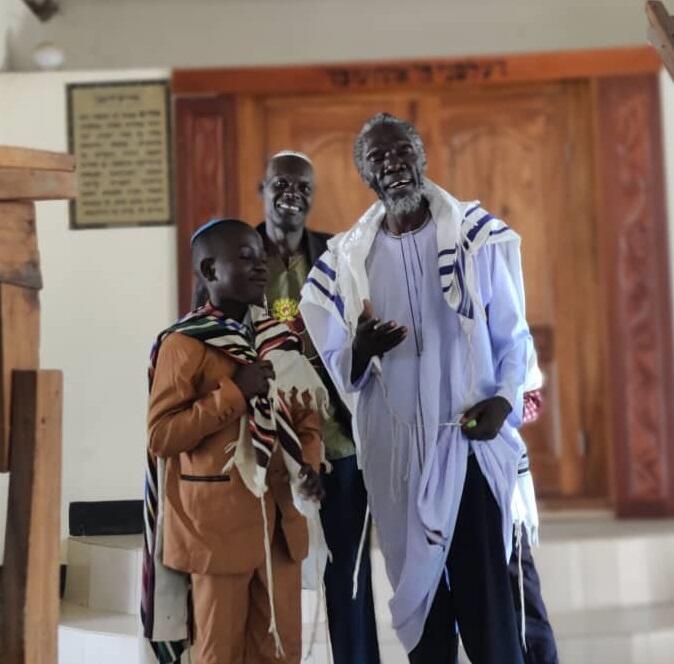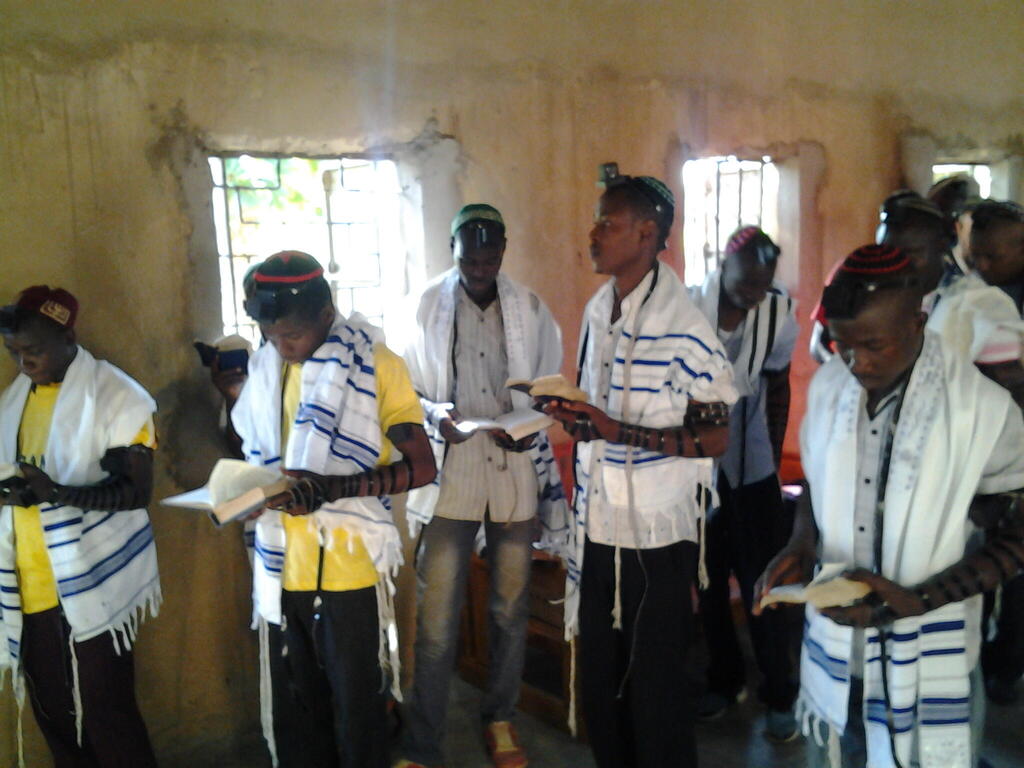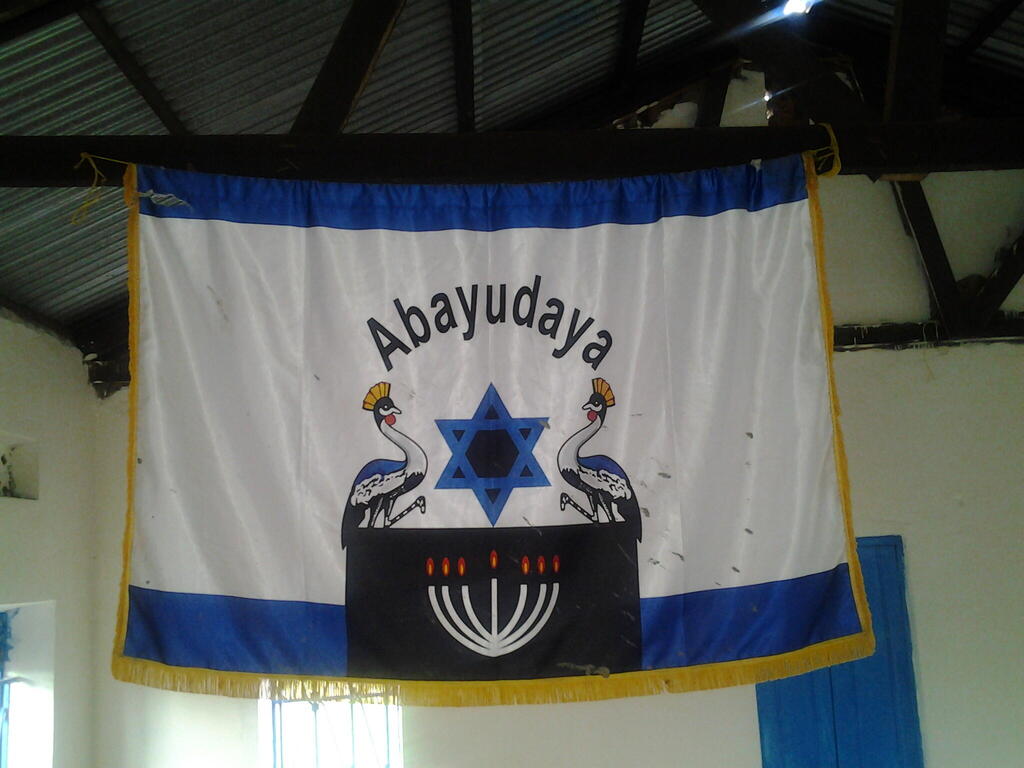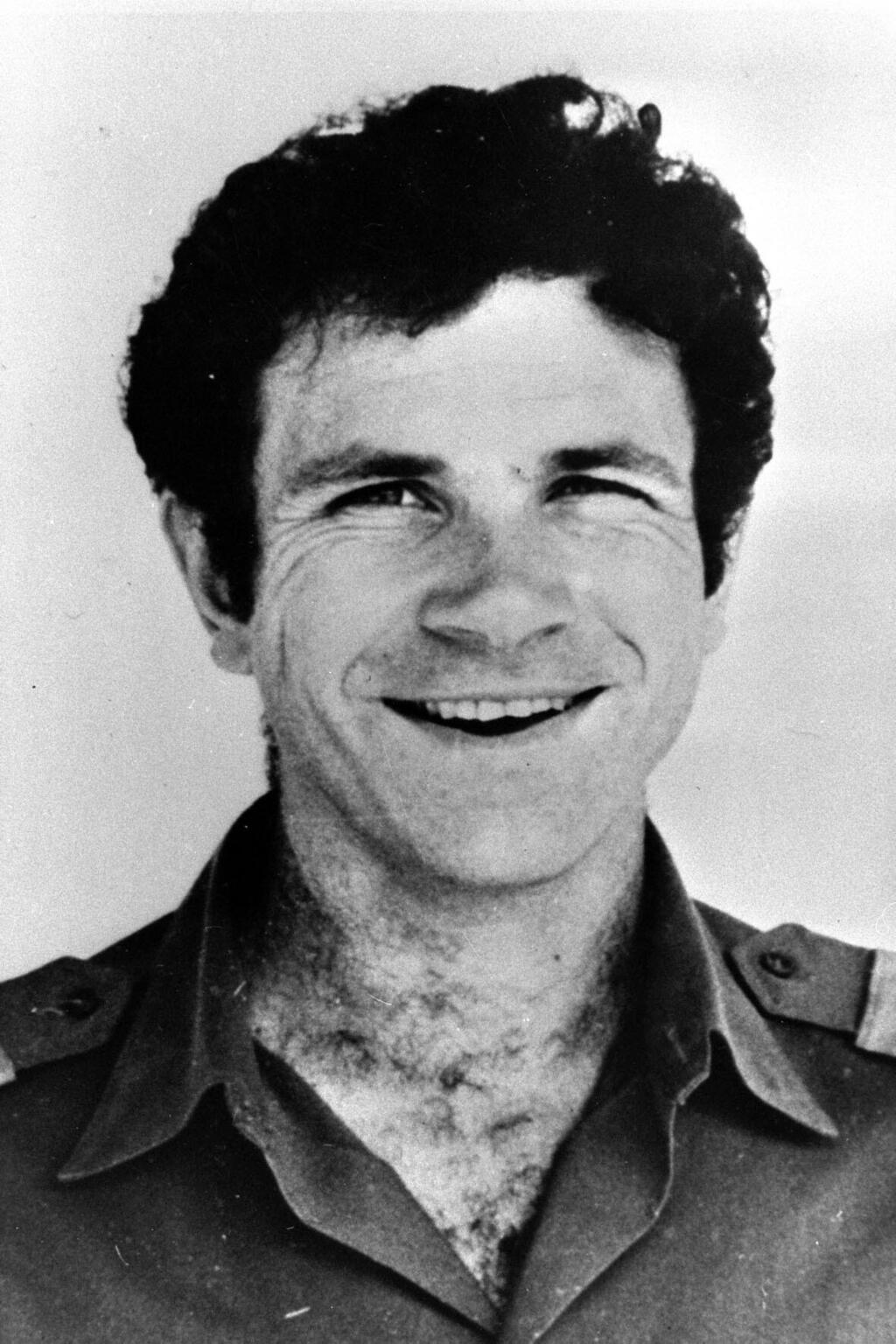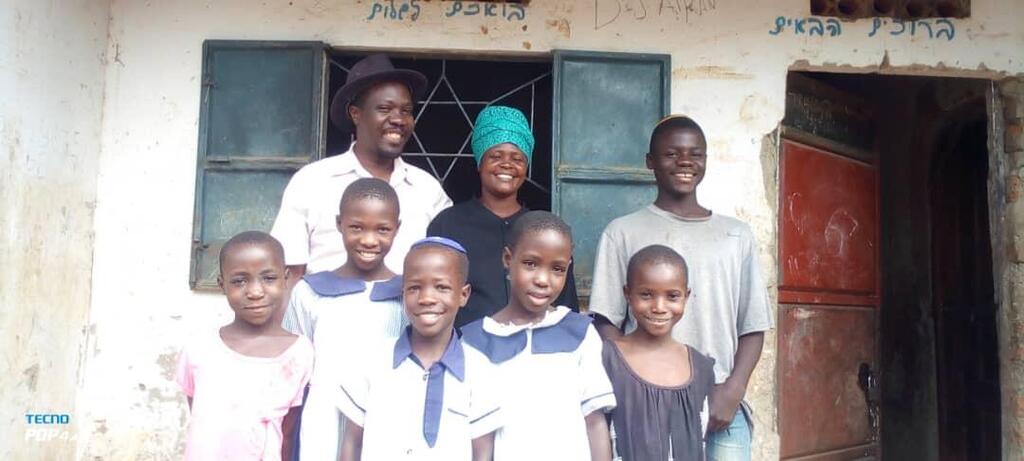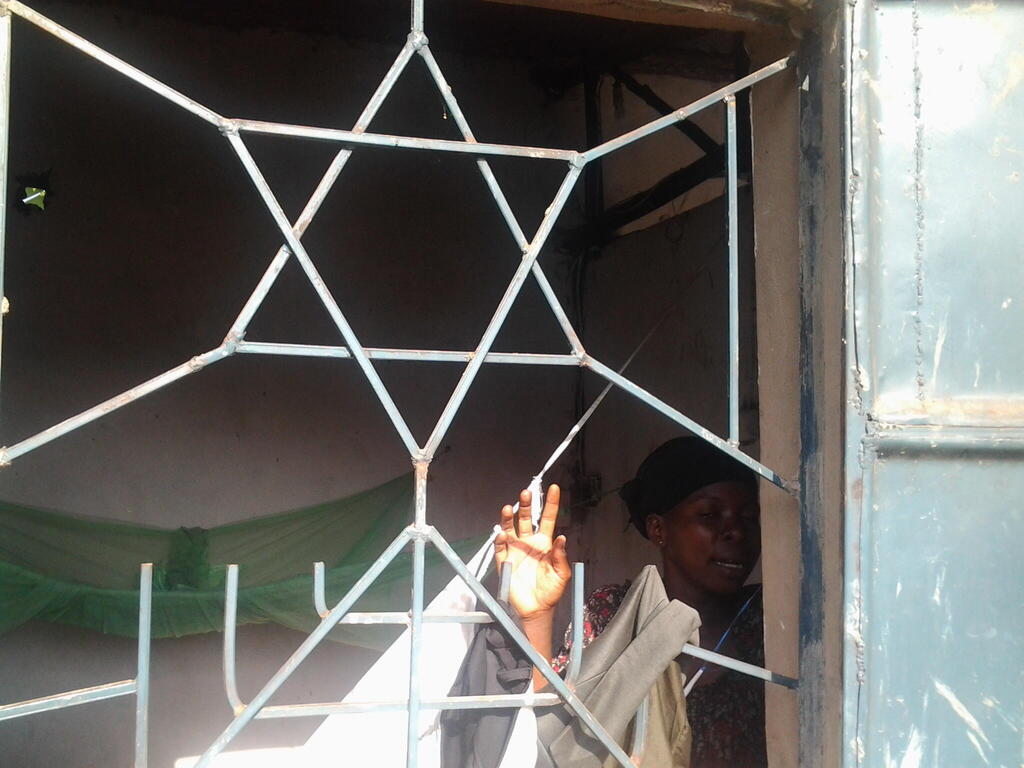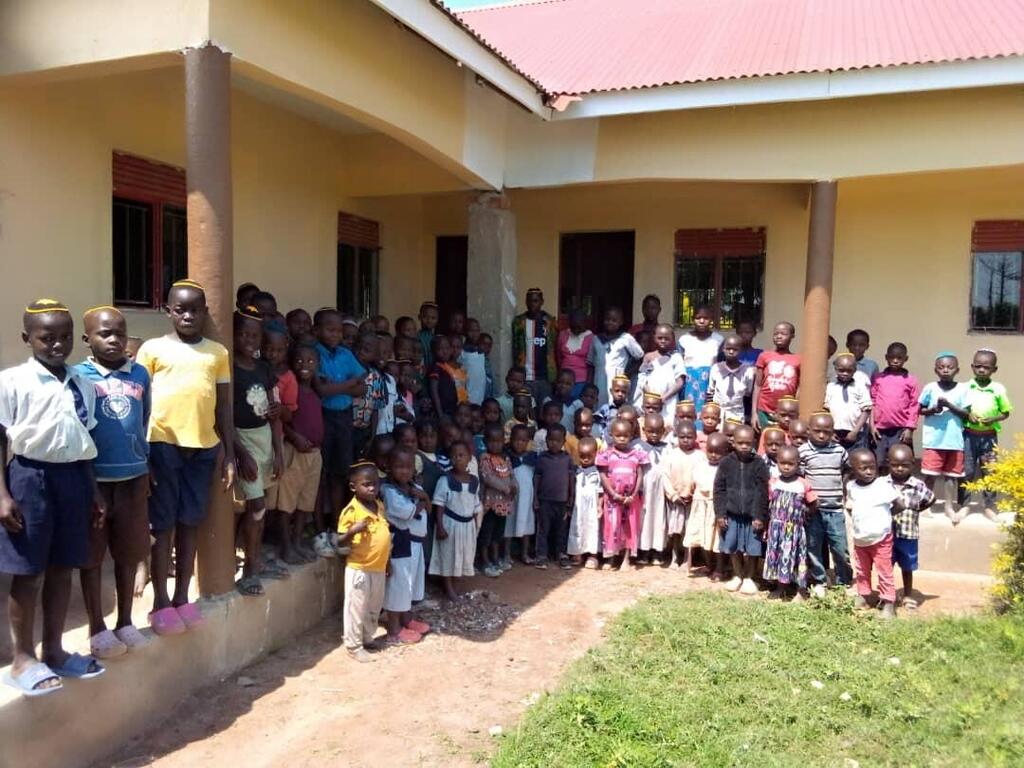Elchanan Kuchar from Pardes Hanna celebrated his bar mitzvah last December and chose to use part of his gifted money to make a meaningful impact. He consulted with his parents and his great uncle, who is very involved in teaching and guiding African Jewish communities, and they connected with the Jewish community in Putti. Their goal is to help complete the construction of the Jonathan Netanyahu Memorial School, which has served Jewish children for over a decade.
Read more:
Elchanan recalls his friends’ skepticism. “Most of my friends said to me, ‘What, are you crazy? You could buy a high-end computer and video game console,’ but there were also some who said, ‘Wow, you're amazing’, and were interested,” he says.
9 View gallery
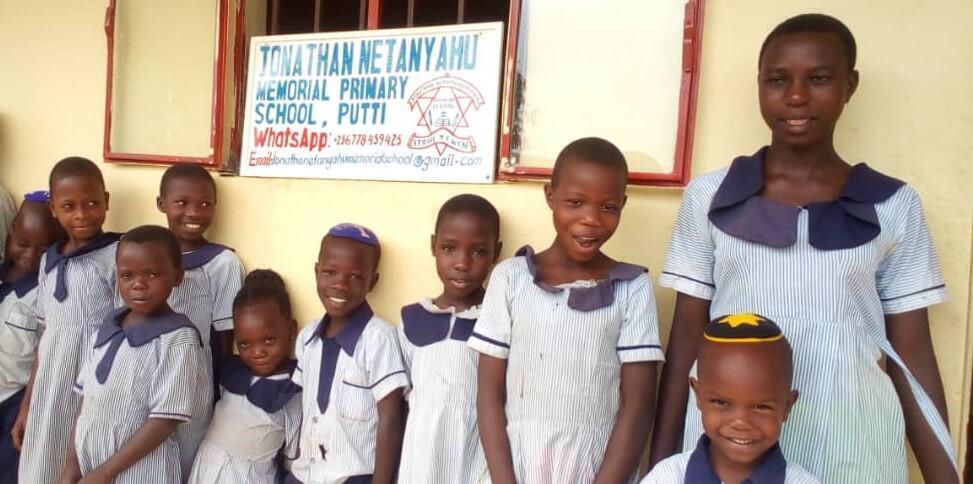

Students of the Jonathan Netanyahu Memorial School in Putti, Uganda
(Photo: Courtesy of Enosh Keki Mainah)
Through a series of donations and crowdfunding campaigns, funding began to pour in. “This is real. It's going to happen,” Elchanan recalls the project gaining momentum. “I am very happy to see that the money is going to a project which really works.”
The Kuchar family moved from Australia in 2016 and settled in Pardes Hanna, Israel. The father, Ari, works in advertising, and the mother, Chava, is a high school English teacher. In addition to their eldest son, Elchanan, they have three more children, aged 10, 7, and 3.
The story began to unfold when the father suggested to his son to donate part of his bar mitzvah money, which was celebrated in Caesarea.
"Elchanan went with the flow and said, 'Why not? I think it’s an excellent idea’," the father recounts proudly. "Several ideas came up. I asked him if he wanted to contribute to something good in Africa.
I was familiar with the village in Uganda from my uncle's stories. I heard about their efforts to establish a school, which would essentially be a Jewish center that would serve as the heart of the community, where activities, classes and synagogue prayers would take place, and more. Until now, they had a small room that served as a school and they had many plans, but they didn't have enough money to realize what they had dreamed and desired."
So Elchanan donated his bar mitzvah money to an inspiring project in the village of Putti in rural Uganda to establish a center that will include new facilities for the local Jewish kindergarten and school, which serve the Abayudaya community, a modest yet devoted group that has embraced Judaism with dreams of immigrating to Israel.
"Now they can finally finish what they started," Ari Kuchar says with satisfaction, "to expand, to build a solar power system, to provide electricity and clean water, to install a filtration system and other things that they need funding for.
I learned about the locals' needs from community members who came from Putti to Israel; we met at my uncle's house in Efrat. Very quickly, I understood the urgency of the donation. Even when we spoke with Enosh Keki Mainah, a central figure in the community — whose son, Yoav Yonadav Keki, who celebrated his bar mitzvah last February, also donated his gift money for the construction — he said: 'Wow. We really need the help.'"
The efforts continued with a crowdfunding campaign to aid the people of Putti, which aimed to raise NIS 12,000 ($3,120). To date, they have raised more than this amount through the campaign, and they are currently in negotiations with Israeli energy companies to provide further assistance.
The entire Kuchar family has mobilized in support of the cause. "We tried to expand our circles as much as possible to increase the donation, and we also connected the villagers with companies that can help them," the family explains. "When the money started to flow, I remember saying to myself, 'This is it. It's going to happen'."
On the Jewish aspect, father Ari adds, "For me, we are all God’s children, but there is something about the Jewish bond that is like family, and it does something special. We are still in the midst of construction and want to see it completed and participate in the housewarming ceremony on-site.
Until now, we haven't had the opportunity to visit there. It is moving to be a part of this and warms the heart to know that every penny goes toward a good cause: not only to the completion of the construction but also to ensure the survival and continuation of this unique community."
Elchanan donated half of his gift money, amounting to over NIS 9,000 ($2350), but the donations keep flowing, with the next goal being NIS 40,000 ($10,500). He shares that "in the digital invitation for the bar mitzvah, we included a link with a video in which my dad talked about the donation and the place, and the guests could see exactly what it was about, witness the work on-site and contribute.
Many people were curious, touched and loved the idea. They, like us, believed it to be a significant value and act of kindness and were happy to donate. In my view, it is the most beautiful gift I could receive for my bar mitzvah."
Without electricity and running water
In 1906, Winston Churchill referred to the African country that Theodor Herzl, the visionary of the Jewish state, and the proponents of the Uganda Scheme wanted to settle with Jews as the “Pearl of Africa.”
Rabbi Eliyahu Birnbaum, a researcher of Diaspora Jewish communities and head of the Ohr Torah Stone Nidchei Israel organization, knows Uganda and the Putti community well. They are located in the heart of the jungle, a six-hour drive from Entebbe airport and about 10 miles from the nearest city, Mbale.
"In Uganda, there were no Jews, and for some reason, Jews did not choose to immigrate there, which is quite surprising, as there is almost no point on the globe that Jews have not reached," he says.
"The phenomenon of Judaism in Uganda is relatively new and was not recognized until the 1930s when the Abayudaya community formed. It is a very painful subject. Ultimately, We were born Jews, but they chose of their own free will to be Jews. They are 100% committed to their Jewish identity; the problem is that, according to Jewish law, it is not enough for you to say 'I want to be a Jew.' A religious court that represents the Jewish people must also tell the convert 'Welcome,' which is the process of conversion."
The Putti Jewish Community (PJC) is part of the Abayudaya (Children of Judah), approximately 4,000 in number, and who reside in eight villages in eastern Uganda.
Rabbi Birnbaum says that "they are not alone. Seekers of Judaism who arrive at the discovery of religious and spiritual truth is a known phenomenon that is occurring especially in these post-modern days.
Today, there are two groups that are part of the Abayudaya, and the difference between them lies in the nature of the conversion. The original group underwent a Conservative conversion at the beginning of the 21st century, about 25 years ago. The second group is called Sheerit Yisrael (the Remnant of Israel'), which includes the residents of Putti. They are interested in Orthodox conversion and have been waiting for it for years. For context, the distance between the two synagogues is about 5 kilometers (3 miles)."
Rabbi Birnbaum is well-acquainted with Enosh Keki Mainah of the Putti community. “Not only was he my student, I also officiated at his wedding,” he shares with a smile. Enosh, which means mankind in Hebrew, is 47 years old, married to Shira and the father of 8 children, in addition to their 10 adopted children. He is a grandfather of two from his eldest daughter, Miriam.
“Our village lacks mains electricity, running water, medical services and good roads,” says Enosh.
"The area of the Putti village covers about 20 square kilometers (8 square miles), and it has a total population of 15,000 people," Mainah continues and shares. "The Jewish community in the village numbers only 250 people. Our school has 187 students, which includes non-Jewish students. Only 63 of the students are Jewish, while the rest are Muslim and Christian. The school is named after Jonathan Netanyahu who fell in Operation Entebbe in 1976, the year I was born,” he adds, referring to a hostage-rescue mission carried out by IDF commandos at Entebbe Airport in Uganda on 4 July 1976.
9 View gallery
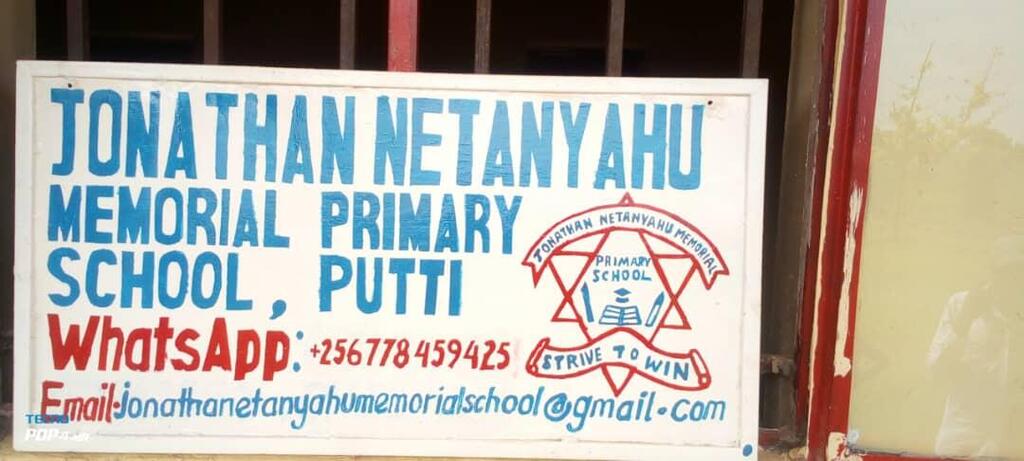

Jonathan Netanyahu Memorial Primary School, in Putti, Uganda
(Photo: Courtesy of Enosh Keki Mainah)
According to him, there is one public elementary school in Putti which has an enrollment of about 1,500 students. “This is a ratio of 200 students per teacher,” he emphasizes.
“There they teach mathematics, English, literature and language, Christianity, Islam and some scientific subjects such as agriculture. Our community chose to establish a Jewish elementary school in order to introduce Jewish education in addition to these subjects.
We have a kindergarten and an elementary school, and our students range in age from 3 to 12. We teach Hebrew, Prayer, Halacha, Tanach and Jewish history, in addition to the secular subjects required by the Ugandan Ministry of Education.”
“The Jonathan Netanyahu Memorial School is still in the tender stage and lacks many things such as school equipment, electricity, water, games, sports equipment and more. Our plan is to build a bigger school that will accommodate all the Jewish children in the area, so that they can all receive a Jewish education and secular professions. We want to give our children the opportunity to grow up with a Jewish base, where they know and preserve the content we, as parents and community, pass on to them.”
Chose to be Jewish
Last February, on Shabbat Yitro, Enosh’s son, Yoav Yonadav, celebrated his bar mitzvah. “He read from the Torah. He received so many gifts and he decided to dedicate them to the development of our local Jewish school.
I am very proud of him, both for his great thought and kindness, and also because education is still a big problem in our village. The more children who can receive education, the brighter their future will be. Another son of ours is now in high school and hopes to become a doctor. We desire to provide a similar opportunity to other children as well.”
"Mainah has visited Israel several times and was enchanted. The first time he came to Israel was in 2014," he recalls. "I left my wife, who was in her fourth month of pregnancy, and came to Israel for a year to study philosophy and Jewish literature at the Machanayim Yeshiva. After five months of my stay in Israel, my wife gave birth to our youngest child, and I named him after Rabbi Shlomo Riskin, who was the chief rabbi of Efrat," he says.
"Only after I finished my year of studies did I return home to Putti. I was very far from my family and my home for a year, but the hospitality I received in Israel made me feel at home," he says.
"I had never been in a society where I could go to kosher supermarkets, stay in kosher hotels, attend yeshivas – and generally, I had never lived in an environment that is 100% Jewish. I did not want to go back to Uganda," he laughs, "and I plan to come and live in Israel, God willing."
One can sense the longing in Enosh's voice, the longing he has for a country that does not really accept him or the members of his community. “We are in the Jerusalem of Uganda. We've chosen to live as Jews”.
"Judaism began here in 1919. A local chief, Semei Kakungulu, had previously been converted to Christianity. He was a military commander and governor in Colonial Uganda. On retirement from military service, he started to read in-depth a Bible that he had received from Christian missionaries. He then realized for the first time that there are many contradictions in the New Testament, such as the Sabbath being shifted to the first day of the week, and issues of the Kosher diet and religious holiday observance, which were not practiced by Christianity. Kakungulu decided to reject the New Testament and chose to live his life according to the Old Testament."
"In 1926, Kakungulu met a Jerusalemite Jewish merchant named Yosef in Kampala, while he was going to court to negotiate a contract that the British had not paid. Kakungulu's distinctive attire caught Yosef's attention and led him to approach Kakungulu to learn about his faith.
“After an in-depth conversation, Yosef was persuaded to visit the Abayudaya community to learn more about it. Once he realized that its members were determined to embrace Judaism, Yosef decided to stay and teach them Halacha (Jewish law). When he left the community members, after more than three months, he donated a number of Jewish religious items such as prayer shawls, phylacteries, Torahs, prayer books, Jewish calendars and more. From one man who circumcised himself and his sons, the first Jewish community in Uganda was born."
The members of the community underwent Conservative conversion by Jewish activists from the United States, but the rabbinical establishment in Israel has never recognized their Judaism. “Israel is the home of every Jew, and our plan is to move to Israel when the opportunity arises,” says Enosh.
“Several people tried to make Aliyah, but Israeli bureaucracy couldn't allow them. Official Jewish recognition is very important to us. The problem is that in the State of Israel, in order to be considered Jewish, one must either be born to a Jewish mother, or undergo an Orthodox conversion process’."
Rabbi Birnbaum says, “We were born Jews, but they chose of their own free will to be Jews”. Enosh’s community was given a 100% Orthodox conversion by Rabbi Shlomo Riskin, chief Rabbi of Efrat in Israel and his beit din.
Antisemitism under Idi Amin
Enosh says that the community faced severe antisemitism during the despotic rule of Idi Amin. “Practice of Judaism was forbidden by law. Anyone who wanted to continue doing so did so at great risk and in secret. Properties such as land were seized by the government and given to Muslims and Christians as punishment for Jews who continued to practice Judaism," he says. The government implemented a very harsh policy that forced many Jews in Uganda to convert in order to escape punishment. The number of Jews was then over 7,000.”
Enosh says, “Recently we fasted on Tisha B'Av, sat on the floor and read the Book of Lamentations. We mourned the destruction of the Temples. Not a day goes by without me saying ‘Next year we will be in the rebuilt Jerusalem’”. He concludes, “I believe it will happen soon. In the meantime, it warms our hearts to know that there are good Jews in Israel and around the world who think about us and care about us.”
Enosh emphasizes, “It's not that life here is bad and it's not that we're not happy, we're very happy here. As soon as the State of Israel gives us the recognition for which we have been waiting for so many years, we will leave our home, the country in which we were born, and we will immigrate to Israel. Even if this takes time, we will not lose our hope.”
“The establishment of the Jewish Center will be a home for the Jews of Putti and the surrounding area,” says Enosh, “and also for Jews from all around the world, including Israeli travelers who visit Uganda. For us, this guarantees the continuity of Judaism in Uganda.”


